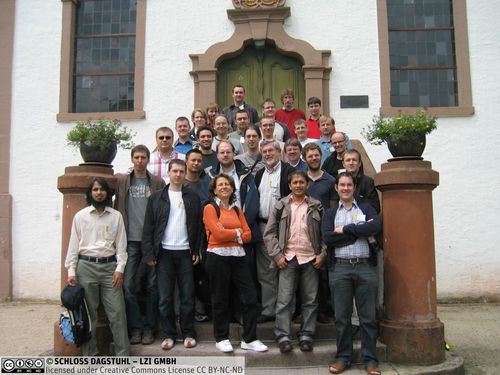Dagstuhl Seminar 08281
Software Engineering for Tailor-made Data Management
( Jul 06 – Jul 11, 2008 )
Permalink
Organizers
- Sven Apel (Universität Passau, DE)
- Don Batory (University of Texas - Austin, US)
- Goetz Graefe (HP Labs - Palo Alto, US)
- Gunter Saake (Universität Magdeburg, DE)
- Olaf Spinczyk (TU Dortmund, DE)
Contact
Tailoring data management components is not only important for the domain of embedded systems. A database management system (DBMS) that provides exactly the functionality that is needed by the platform, the application scenario, and the stakeholder's requirements, yields several benefits, e.g., a lean and well-structured code base, robustness, and maintainability.
The desire for tailor-made data management solutions is not new: concepts like kernel-systems or component toolkits have been proposed 20 years ago. However, a view on the current practice reveals that nowadays data management solutions are either monolithic DBMS such as ORACLE and DB2 or special-purpose systems developed from scratch for specific platforms and scenarios, e.g., for embedded systems and sensor networks.
While monolithic DBMS architectures hinder a reasonable and effective long-term evolution and maintenance, special-purpose solutions suffer from the conceptual problem to reinvent the wheel for every platform and scenario or to be too general to be efficient. A mere adaptation of present solutions is impossible from the practical point of view, e.g., it becomes too expensive or simply impractical, which is confirmed by the current practice. Especially in the domain of embedded and realtime systems there are extra requirements on resource consumption, footprint, and execution time. That is, contemporary data management solutions have to be tailorable to the specific properties of the target platform and the requirements and demands made by the stakeholders and the application scenario.
The question that arises is what is different now from the attempts made some years ago that makes us believe that something can change in future. This question and possible answers from the field of modern software engineering have been discussed in the Dagstuhl Seminar "Software Engineering for Tailor-made Data Management", July 6h to July 11th, 2008.
In 12 sessions, 21 talks have presented recent work and new ideas regarding trends in software engineering and their application to the development of tailor-made data management solutions. On the one hand, there were researchers from the database community who stressed the necessity of tailoring data management solutions, e.g., in order to be able to adapt them at runtime in a service-oriented world or to provide different variants for query processing and optimization. On the other hand, several researchers from the software engineering and programming languages communities presented new ideas to build, manage, and evolve complex systems such as database systems. Continuous discussions have connected the different views of both communities. A recurring idea was to think in terms of families of DMS instead of individual systems. Members of a DMS family share common "features" with the goal of reuse. Several researchers presented mechanisms for identifying, implementing, and managing features or reported from success stories in the field of DMS or related domain.
In two special sessions the participants have been split into three discussion groups addressing the specific topics of tailor-made data management solutions:
- "Software Engineering or C for Embedded Systems?"
- "Dynamic Adaptation in DBMS - Is There a Use Case?"
- "DBMS in 10 Years - How Can Software Engineering Help?"
In a wrap-up session, the participants have reflected the program and discussions of the seminar. The general opinion was that both communities have learned much from each other. Individual joint projects have been planned, a mailing list has been installed, and a continuation of a related workshop series has been encouraged.
- Sven Apel (Universität Passau, DE) [dblp]
- Danilo Beuche (pure-systems GmbH - Magdeburg, DE) [dblp]
- Johan Fabry (University of Chile - Santiago de Chile, CL) [dblp]
- Bernd Fischer (University of Southampton, GB) [dblp]
- Peter Fischer (ETH Zürich, CH)
- Theo Härder (TU Kaiserslautern, DE) [dblp]
- Florian Heidenreich (TU Dresden, DE)
- Florian Irmert (Universität Erlangen-Nürnberg, DE)
- Hans-Arno Jacobsen (University of Toronto, CA) [dblp]
- Christian Kästner (Universität Magdeburg, DE) [dblp]
- Stefan Krompaß (TU München, DE)
- Thomas Leich (METOP GmbH - Magdeburg, DE) [dblp]
- Jörg Liebig (Universität Magdeburg, DE) [dblp]
- Klaus Meyer-Wegener (Universität Erlangen-Nürnberg, DE) [dblp]
- Syed Saif ur Rahman (Universität Magdeburg, DE)
- Marko Rosenmüller (Universität Magdeburg, DE)
- Gunter Saake (Universität Magdeburg, DE) [dblp]
- Kai-Uwe Sattler (TU Ilmenau, DE) [dblp]
- Horst Schirmeier (TU Dortmund, DE) [dblp]
- Karsten Schmidt (TU Kaiserslautern, DE)
- Wolfgang Schröder-Preikschat (Universität Erlangen-Nürnberg, DE) [dblp]
- Sandro Schulze (Universität Magdeburg, DE) [dblp]
- Norbert Siegmund (Universität Magdeburg, DE) [dblp]
- Julio Sincero (Universität Erlangen-Nürnberg, DE)
- Olaf Spinczyk (TU Dortmund, DE) [dblp]
- Ionut Subasu (Universität Zürich, CH)
- Sagar Sunkle (Universität Magdeburg, DE)
- Letizia Tanca (Polytechnic University of Milan, IT)
- Salvador Trujillo (Ikerlan Research Centre - Arrasate-Mondragón, ES) [dblp]
Classification
- data bases / information retrieval
- sw-engineering
Keywords
- tailor-made data management
- DBMS architectures
- software engineering
- DBMS product lines
- embedded data management


